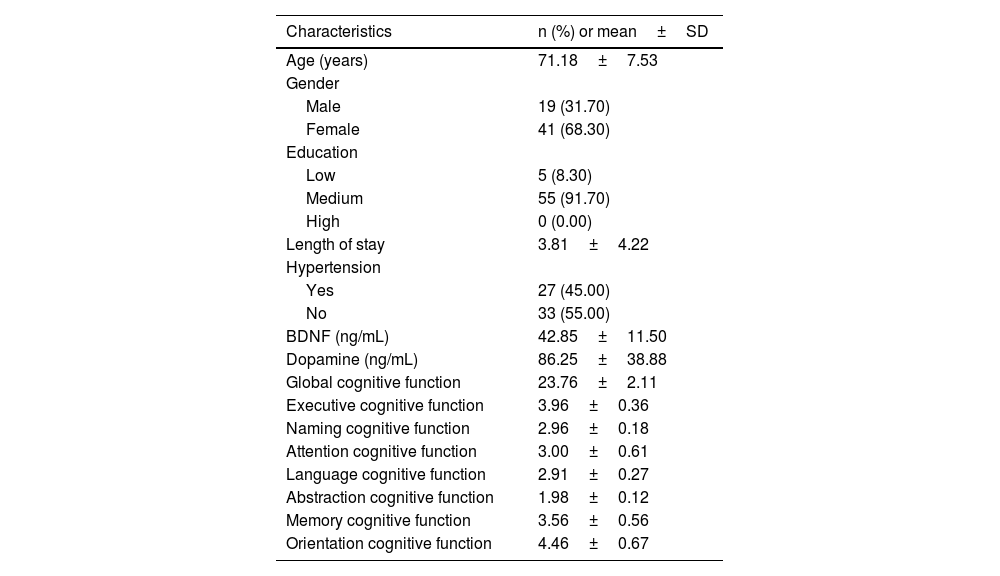Many older adults in Indonesia decide to live in nursing homes. Living in a nursing home has been associated with the incidence of cognitive decline in older adult that leads to decreasing ability to perform daily activity. This study aimed to determine the association between demographic and clinical characteristics with cognitive functions in older adults living in nursing homes in Indonesia.
MethodsThis study used a cross-sectional design and involved 60 older adults in a nursing home. Cognitive function was evaluated using the Montreal Cognitive Assessment (MoCA) instrument. Demographic and clinical characteristics such as age, education level, length of stay in the nursing home, as well as serum levels of brain-derived neurotrophic factor (BDNF) and dopamine were studied. Spearman-Rank test was used for data analysis.
ResultsCognitive function of attention had a positive correlation with age (r=0.314, P=.015), length of stay in the nursing home (r=0.268, P=.038), and negative correlation with dopamine serum levels (r=−0.425, P=.001). The cognitive function of naming has a positive correlation with age (r=0.263, P=.042).
ConclusionsAge, length of stay, and dopamine levels associated with cognitive function in older adult living in nursing homes. The older adult should be assessed in term of factors associated with cognitive function to make the cognitive improvement programs in nursing homes.
Muchos adultos mayores en Indonesia deciden vivir en residencias de ancianos. Vivir en un hogar de ancianos ha sido asociado al deterioro cognitivo en adultos mayores, afectando a la capacidad para llevar a cabo actividades de la vida diaria. Este estudio tuvo como objetivo determinar la asociación entre características demográficas y clínicas y la función cognitiva en adultos mayores que viven una residencia de ancianos en Indonesia.
MétodoEste estudio utilizó un diseño transversal, participando 60 adultos mayores de una residencia de ancianos. La función cognitiva se evaluó utilizando el instrumento Montreal Cognitive Assessment (MoCA). Se evaluaron características demográficas y clínicas como edad, nivel educativo, tiempo de permanencia en la residencia, así como niveles séricos de factor neurotrófico derivado del cerebro (BDNF) y dopamina. Se utilizó la prueba de Spearman-Rank para el análisis de datos.
ResultadosLa función cognitiva de atención se correlacionó positivamente con la edad (r=0,314, P=,015) y el tiempo de permanencia en la residencia (r=0,268, P=,038), y negativamente con los niveles séricos de dopamina (r=−0,425, P=,001). La función cognitiva de denominación se relacionó positivamente con la edad (r=0,263, P=,042).
ConclusionesEdad, tiempo de internado, y niveles de dopamina se asociaron a la función cognitiva en adultos mayores que viven en una residencia de ancianos. El adulto mayor debe ser evaluado en cuanto a factores asociados a la función cognitiva, para realizar los programas de mejora cognitiva en residencias de ancianos.
Artículo
Comprando el artículo el PDF del mismo podrá ser descargado
Precio 19,34 €
Comprar ahora








